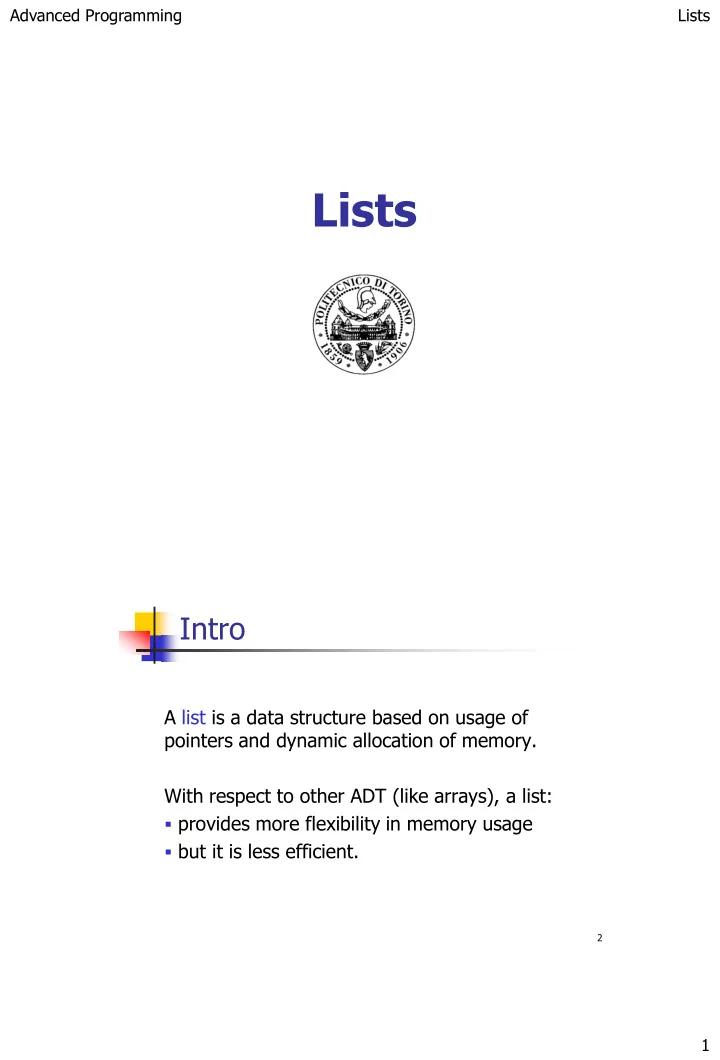

Advanced Programming Lists Lists Intro A list is a data structure based on usage of pointers and dynamic allocation of memory. With respect to other ADT (like arrays), a list: provides more flexibility in memory usage but it is less efficient. 2 1
Advanced Programming Lists Definition A list is an ADT where: Each element is allocated/deallocated separately Each element is linked to the others and accessible through pointers There is a variable (called head) which refers to the first element. 3 Simple List head Data Data Data Data 4 2
Advanced Programming Lists Linked List Properties In every moment only the necessary memory is effectively used Accessing to an element may require to access in sequence to all elements of the list 5 Variants Other variants of linked lists, are: Circular lists, where last element points to the first element (the head of the list) Double-pointer Lists where each element contains both a pointer to the previous element and a pointer to the following element. 6 3
Advanced Programming Lists Double Pointer Lists head Data Data Data Data 7 Implementation in C /* element definition */ typedef struct list_el{ int code; char *name; char *surname; struct list_el * next; } LIST_ELEMENT; /* head pointer definition */ LIST_ELEMENT * head = NULL; 8 4
Advanced Programming Lists Head Insertion … LIST_ELEMENT * p; … p=(LIST_ELEMENT *) malloc(sizeof(LIST_ELEMENT)); if (p==NULL) ERROR p->code = val; p->name = strdup(name); p->surname = strdup(surname); p->next = head; head = p; … 9 Before Head Insertion head Data Data Data NULL 10 5
Advanced Programming Lists After Head Insertion head Data Data Data Data NULL 11 Insert function int insert (LIST_ELEMENT ** t, int val, char *name, char *surname) { LIST_ELEMENT *p; p=(LIST_ELEMENT *) malloc(sizeof(LIST_ELEMENT)); if (p==NULL) return (-1); p->codee=val; p->name = strdup(name); p->surname = strdup(surname); p->next=*t; /* head is *t */ *t=p; return 0; } 12 6
Advanced Programming Lists Caller Program … LIST_ELEMENT * head; int ret, val; char name[MAX], surname[MAX]; … scanf ("%d, %s %s\n", &val, name, surname); ret=insert ( &head, val, name, surname); if (ret == -1) ERRORE 13 Search LIST_ELEMENT * search (LIST_ELEMENT *t, int val) { LIST_ELEMENT *p; p=t; while (p != NULL) { if (p->code == val) return (p); p = p->next; } return p; } 14 7
Advanced Programming Lists Caller Program … LIST_ELEMENT *head, *p; int val; … scanf ("%d\n", &val); p= search (head, val); if (p == NULL) printf ("Element not found \n"); else printf ("%d %s %s\n", p->code, p->name, p->surname); … 15 Sorted Lists If the insertion procedure puts the new element in the right position, then the list can be kept sorted (with respect to one field of the struct ). In this way is possible to: Simplify search operations Access to elements in an ordered way. 16 8
Advanced Programming Lists Insertion in a sorted list int insert_sorted (LIST_ELEMENT **t, int val, char *name, char *surname) { LIST_ELEMENT *p, *q; /* allocate new element */ p= (LIST_ELEMENT *) malloc(sizeof(LIST_ELEMENT)); if (p==NULL) return (-1); p->code=val; p->name = strdup(name); p->surname = strdup(surname); q = *t; /* head insertion */ if( (q == NULL) || (q->code > val)) { p->next = *t; *t = p; return 0; } 17 Insertion in a sorted list /* insertion in the middle of the list */ while( q->next != NULL) { if( q->next->code > val) { p->next = q->next; q->next = p; return 0; } q = q->next; } /* insertion in the end of the list */ p->next = NULL; q q->next = p; return 0; Data Data } 18 9
Advanced Programming Lists Delete Deleting an element usually requires: The search operation, which produces a pointer to the element to be canceled The actual delete operation which requires: the pointer to the element to be canceled and the pointer to the preceding element. 19 Delete int delete(LIST_ELEMENT **t, int val) { LIST_ELEMENT *p, *q; q = *t; if (q==NULL) /* empty list */ return (-1); /* head delete */ if (q->code == val)) {free (q->name); free (q->surname); *t = q->next; free (q); return 0; } 20 10
Advanced Programming Lists Delete /* delete in the middle or in the end of list */ while( q->next!= NULL) { if( q-> next->code == val) { q->next = q->next->next; free (q->next->name); free (q->next->surname); free (q->next); return 0; } q = q->next; } } 21 Complexity Insertion in the head of the list has a complexity O(1). All other operations on lists have O(n) complexity, as in the worst case they requires visiting all the list elements. 22 11
Advanced Programming Lists Guards It may be convenient to add to the list some fake elements (called guards ) which allow Simplifying code for list management Improving efficiency, without changing its worst-case complexity. 23 Guards: unsorted lists In this case 2 guards are used (one in the head, one in the tail). Guards may simplify code as it is no more necessary to consider as separate cases insertion/deletion in head and tail. 24 12
Advanced Programming Lists Example head Data Data NULL Guard Guard 25 Guards: Ordered Lists In this case guards contain the minimum and maximum value that can be stored. In this way Code is more simple (insert/delete in head/tail are no more separated cases) Execution is faster , as test at the end of the list is now useless. 26 13
Advanced Programming Lists Example head Data MAX_INT MIN_INT Data NULL 27 Faster Algorithm LIST_ELEMENT * search (LIST_ELEMENT *t, int val) { LIST_ELEMENT *p; { LIST_ELEMENT *p; p=t; p=t; while (p!=NULL) while (p->code < val) { if (p->code==val) p=p->next; return p; if (p->code == val) p=p->next; return p; } else return p; return NULL; } } Each iteration contains Each iteration contains two tests only one test 28 14
Recommend
More recommend